Molybdenum-disulfide, known as Moly, is a black, slick compound used to coat copper jacket bullets. It lubricates the bullet and reduces friction when the bullet travels down the bore. This is meant to facilitate a long string of shots between cleaning without affecting accuracy. However, it’s not quite that simple and moly coating has its drawbacks.
- It can destroy your barrel because water gets trapped and causes severe pitting.
- Temperature changes can cause the metal to sweat (having the gun inside a warm house then taking the gun out into the cold).
- Moly is particularly difficult to get out the barrel.
- Moly conditioned barrels won’t shoot standard copper bullets accurately.
- Stainless barrels are also affected.
A lot of the high-end manufacturers don’t advise using moly coated bullets as moly quickly became a trend without sufficient research to determine its effectiveness and safety.
But for those who want to start moly coating, there is a cheaper way to do it other than buying expensive factory-made moly coated bullets. After purchasing moly powder, clean the bullets with alcohol and dry them thoroughly. For every pound of bullets placed in the tumbler, use an eighth of a teaspoon of moly powder. Once the moly is added to the tumbler, let it run for about an hour. When the cycle is finished, remove the bullets and shake off any excess powder using a towel or plastic screen. And, that’s it!
But let’s get back to why moly isn’t always the best idea. Several gunsmiths claim that moly fouls the barrel quite badly, which is why benchrest shooters are choosing Danzac instead.
And coating the inside of the barrel is not an option because over time, it weakens the barrel when moly particles get trapped in every crevice that eventually creates rifts. This is particularly evident if the barrel is cycled through extreme temperatures. However, different people get different results in different scenarios.
Some get good results using moly for competition rifles but not with a work rifle, which had inconsistent shots from a clean barrel. There are also varying results if using bullets that are dry coated with moly, and bullets that are greased with moly-enhanced grease. A test at 200 yards between the two showed that with a clean and dry barrel, the velocities climbed slowly for 5-7 shots with dry moly. With the moly-enhanced grease, the velocities were there at the start. The moly-enhanced grease is readily available with moly grease mixed with powdered moly until it is a bit dry.
To moly or not to moly, that is the question. What are the benefits other than less cleaning time? Unless you want to fire off 300 rounds between cleanings, then yes, moly-coated bullets will save you a couple of minutes. There’s no hard evidence that it improves accuracy as there are differing opinions on this between shooters.
With regards to velocity, some shooters say uncoated bullets had .5″ five shot groups at 2650 fps where the moly rounds shot this group at 2430 fps. The more the charge was increased to get the velocity, it degraded the accuracy and it wasn’t possible to match that 2650/.5″ group with moly, regardless of the charge. It seems more often than not moly doesn’t increase accuracy at any range or that there is no noticeable difference.
For a Cold Barrel Shot, moly couldn’t provide consistency on a clean rifle and takes about 10 rounds to get back on track, which isn’t acceptable. When it comes to getting on target at long ranges, it may require wasting a few rounds to find the zero, particularly from a clean bore. Cleaning a bore that’s broken in properly shouldn’t present any issues. While it may require less cleaning, there is still a build-up in the barrel, even if it is not copper. The problem is becoming too accustomed to not cleaning the rifle and then important things will be missed. And, moly doesn’t preserve barrel longevity, even after extensive testing.
Ultimately, moly comes with hassles as it warrants additional yet pointless steps to the reloading process and more expensive equipment is required. While some swear by moly, others report it’s just not worth it. True consistency comes with uncoated bullets. So, there’s no real benefit in moly coating unless you’re using a bad bore, and then you might see a slight improvement.
Overall, moly coated bullets show accuracy reduction more than anything else. When it comes to a bullet traveling down a rifle barrel, the less lubrication, the better as it can cause blockages. However, by working up a load that can be reproduced consistently, moly or no moly, performance is the same over and over. The bore and its condition are determining factors when it comes to the success of using moly.
For tactical shooting, moly is not an option. There’s nothing wrong with experimenting on a varmint rifle, but not a tactical rifle. So, why use moly?
Importer of Berger bullets say that since the bullet forms with force into the rifling, small portions of the jacket material form into little fins that protrude into the area where the boat-tail begins and act as air vanes. With a moly bullet, the jacket material forms better into the lands and grooves, but it’s not forced into the little fins. They say moly produces a sleeker bullet during flight as there are little surface imperfections that can be affected by the drag.
In summary, moly coated bullets aren’t worth the trouble unless a standard for cleaning and curing can be established. Bullet coating in general is a debatable subject whether you’re using Hexagonal Boron Nitride (HBN), Danzac or Moly. A lot of shooters feel that bullet coating helps especially where it’s required to shoot off a string of rounds without having to stop and clean. If coated bullets reduce fouling, that gives more time for shooting and less time for cleaning. There are a lot of variables to consider when deciding what works best for your shooting.

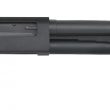
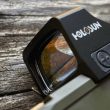
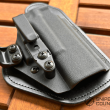
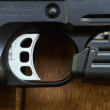

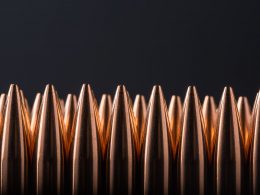


My gun shoots 1hole groups with moly coated 69 gr smk’s. May have to learn to molycoat myself since Sierra stopped making em.
Not so sure on this article, don’t under estimate Moly. I coat all my Bullets and I can literally shoot one hole groups out of my 221 Fireball, 22-250, 6.5×284 with a Hart 30” barrel. Hell I even used spray Moly on my 350 Legend Savage Axis Bullets and it’s works fantastic.
I am not sure if this article is of any value. I use hBN and are extremely happy with the improvement in the consistency of shots from cold to hot barrel. Cleaning the barrel is also much less laborious. I have no proof, but expect the barrel to have an extended life compared to using uncoated bullets.
Moly stops my bullets from spinning apart.